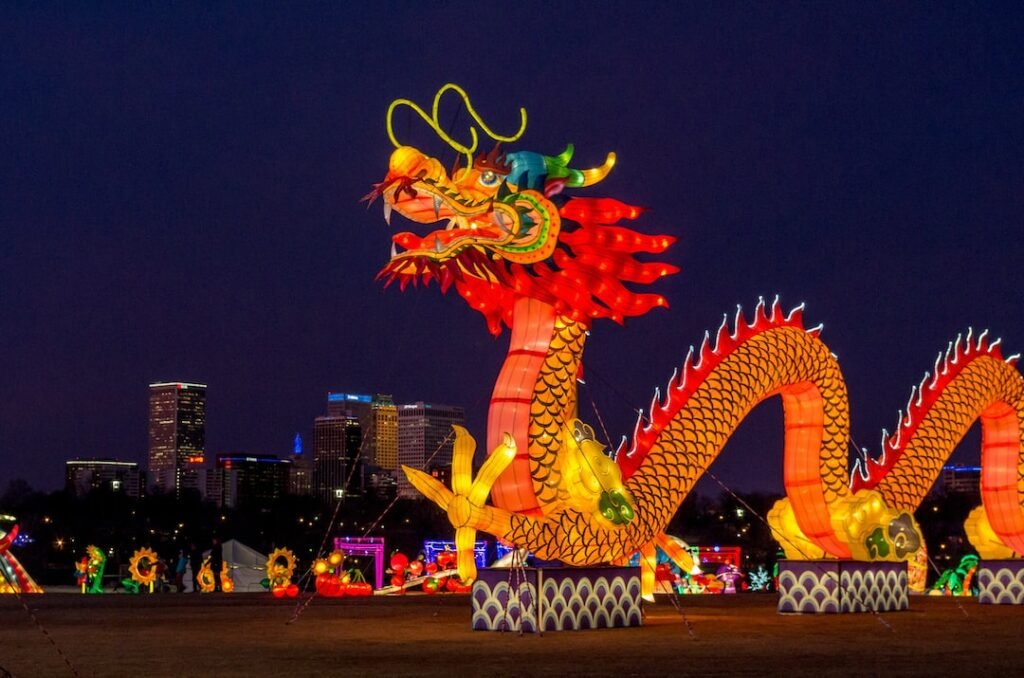Chinese folktales have a long and rich history that dates back thousands of years. These stories have been passed down through generations and have become an integral part of Chinese culture. They serve as a way to teach moral lessons, preserve cultural traditions, and entertain audiences of all ages.
The origins of Chinese folktales can be traced back to ancient times when storytelling was an important form of communication. These stories were often told orally and were passed down from one generation to the next. Over time, they were written down and became an important part of Chinese literature.
Chinese folktales are significant in Chinese culture because they reflect the values, beliefs, and traditions of the Chinese people. They often contain moral lessons that teach virtues such as loyalty, filial piety, and humility. These stories also showcase the rich mythology and folklore of China, including tales of gods, goddesses, mythical creatures, and legendary heroes.
Table of Contents
ToggleKey Takeaways
- Chinese folktales are an important part of Chinese culture and have been passed down for generations.
- The Legend of the White Snake, the Story of the Monkey King, and the Tale of the Cowherd and the Weaver Girl are some of the most well-known Chinese folktales.
- The Legend of the Dragon Boat Festival, the Story of the Eight Immortals, the Legend of the Moon Goddess, and the Tale of the Jade Emperor and His Court are also significant Chinese folktales.
- The Story of the Three Kingdoms is a historical Chinese tale that has been adapted into many different forms of media.
- The Legend of the Red Thread is a popular Chinese belief that two people are connected by a red thread and destined to meet.
The Legend of the White Snake and Its Vocabulary
The Legend of the White Snake is one of the most famous Chinese folktales. It tells the story of a white snake who transforms into a beautiful woman and falls in love with a mortal man named Xu Xian. However, their love is forbidden by the gods, and they face many obstacles in their quest to be together.
One vocabulary word from this story is “immortal,” which refers to a being who is not subject to death or decay. In Chinese mythology, immortals are often depicted as wise and powerful beings who possess magical abilities.
Another vocabulary word from this story is “serpent,” which refers to a large snake or a mythical creature with the body of a snake. In Chinese folklore, serpents are often associated with wisdom, power, and transformation.
The Story of the Monkey King and Its Vocabulary
The Story of the Monkey King, also known as Journey to the West, is another popular Chinese folktale. It follows the adventures of Sun Wukong, a mischievous and powerful monkey who seeks immortality and becomes a disciple of the Buddhist monk Xuanzang.
One vocabulary word from this story is “disciple,” which refers to a student or follower of a teacher or master. In the context of the Monkey King, Sun Wukong becomes a disciple of Xuanzang and accompanies him on his journey to retrieve Buddhist scriptures.
Another vocabulary word from this story is “demon,” which refers to an evil or supernatural being. In the Monkey King, Sun Wukong encounters many demons and uses his magical powers to defeat them.
The Tale of the Cowherd and the Weaver Girl and Its Vocabulary
The Tale of the Cowherd and the Weaver Girl, also known as the Chinese Valentine’s Day story, is a romantic folktale that has been passed down for centuries. It tells the story of a cowherd named Niulang and a weaver girl named Zhinu who fall in love but are separated by the gods.
One vocabulary word from this story is “constellation,” which refers to a group of stars that form a pattern or shape. In the Tale of the Cowherd and the Weaver Girl, Niulang and Zhinu are separated by the gods and placed in different constellations.
Another vocabulary word from this story is “magpie,” which refers to a type of bird with black and white feathers. In Chinese folklore, magpies are often associated with love and are believed to be messengers between lovers.
The Legend of the Dragon Boat Festival and Its Vocabulary
The Legend of the Dragon Boat Festival is a popular Chinese folktale that explains the origins of the Dragon Boat Festival, which is celebrated on the fifth day of the fifth lunar month. It tells the story of Qu Yuan, a poet and statesman who drowned himself in the river to protest against political corruption.
One vocabulary word from this story is “dragon,” which refers to a mythical creature with the body of a snake, the scales of a fish, and the claws of an eagle. In Chinese culture, dragons are considered to be powerful and benevolent creatures that bring good luck and fortune.
Another vocabulary word from this story is “festival,” which refers to a special event or celebration. The Dragon Boat Festival is a traditional Chinese festival that involves dragon boat races, eating sticky rice dumplings, and hanging up pouches of herbs to ward off evil spirits.
The Story of the Eight Immortals and Their Vocabulary

The Story of the Eight Immortals is a popular Chinese folktale that features eight legendary figures who possess immortality and magical powers. Each immortal has their own unique personality and abilities, and they often appear together in Chinese art and literature.
One vocabulary word from this story is “immortality,” which refers to the state of being able to live forever. In Chinese mythology, immortality is often associated with spiritual enlightenment and the attainment of wisdom.
Another vocabulary word from this story is “magic,” which refers to supernatural powers or abilities. The Eight Immortals are known for their magical abilities, such as flying through the air, transforming objects, and healing the sick.
The Legend of the Moon Goddess and Its Vocabulary
The Legend of the Moon Goddess is a Chinese folktale that explains the origins of the Mid-Autumn Festival, which is celebrated on the 15th day of the eighth lunar month. It tells the story of Chang’e, a beautiful woman who becomes an immortal after drinking an elixir of immortality.
One vocabulary word from this story is “elixir,” which refers to a magical potion or substance that is believed to have the power to grant eternal life or youth. In Chinese mythology, elixirs are often associated with immortality and spiritual enlightenment.
Another vocabulary word from this story is “moon,” which refers to the natural satellite that orbits the Earth. In Chinese culture, the moon is often associated with beauty, femininity, and the reunion of loved ones.
The Tale of the Jade Emperor and His Court and Its Vocabulary
The Tale of the Jade Emperor and His Court is a Chinese folktale that tells the story of the Jade Emperor, the ruler of heaven, and his court of gods and goddesses. It explains how the Jade Emperor came to power and how he maintains order in the universe.
One vocabulary word from this story is “emperor,” which refers to a ruler or monarch who holds supreme power and authority. In Chinese culture, the emperor is considered to be the highest-ranking official and is often associated with wisdom and divine power.
Another vocabulary word from this story is “court,” which refers to a formal assembly or gathering of people who are involved in the administration of justice or government. In the Tale of the Jade Emperor and His Court, the court of gods and goddesses assists the Jade Emperor in maintaining order in the universe.
The Story of the Three Kingdoms and Its Vocabulary
The Story of the Three Kingdoms is a Chinese historical novel that tells the story of the Three Kingdoms period in ancient China. It follows the lives and struggles of various warlords as they vie for control over China.
One vocabulary word from this story is “warlord,” which refers to a military leader who has control over a region or territory. In the Story of the Three Kingdoms, warlords such as Cao Cao, Liu Bei, and Sun Quan fight for power and dominance.
Another vocabulary word from this story is “kingdom,” which refers to a country or territory that is ruled by a king or queen. In the Three Kingdoms period, China was divided into three kingdoms: Wei, Shu, and Wu.
The Legend of the Red Thread and Its Vocabulary
The Legend of the Red Thread is a Chinese folktale that explains the concept of the “red thread of fate,” which is believed to connect two people who are destined to be together. According to the legend, an invisible red thread connects two people who are meant to be soulmates, regardless of time, place, or circumstances.
One vocabulary word from this story is “fate,” which refers to a predetermined course of events that is believed to be beyond human control. In Chinese culture, fate is often associated with the concept of predestination and the belief that certain events are meant to happen.
Another vocabulary word from this story is “soulmate,” which refers to a person with whom one has a deep and natural affinity or connection. In the Legend of the Red Thread, the red thread symbolizes the bond between soulmates and represents their inevitable reunion.
Chinese folktales play a significant role in Chinese culture as they reflect the values, beliefs, and traditions of the Chinese people. They serve as a way to teach moral lessons, preserve cultural traditions, and entertain audiences of all ages. By exploring Chinese folktales and their vocabulary, we can gain a deeper understanding of Chinese culture and appreciate the rich mythology and folklore that has been passed down through generations. So, let us delve into the world of Chinese folktales and discover the wisdom and magic they hold.







